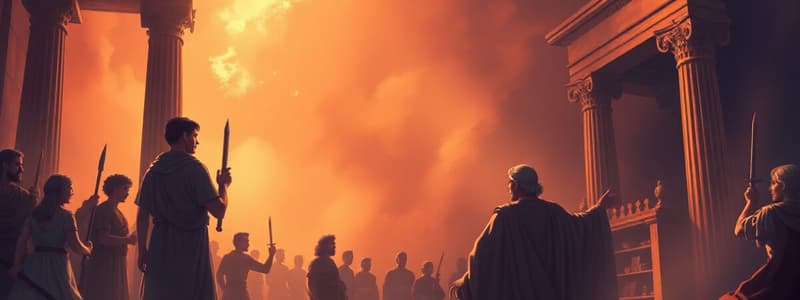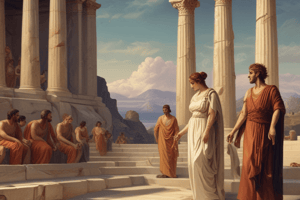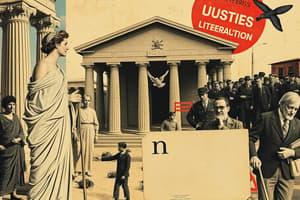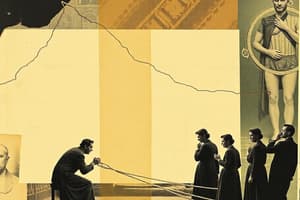Podcast
Questions and Answers
What must be done to understand the relationship between personal and impersonal elements in history?
What must be done to understand the relationship between personal and impersonal elements in history?
- It must be glossed over.
- It must be superficially analyzed.
- It must be casually interpreted.
- It must be carefully studied. (correct)
Which approach is least likely to uncover the nuances of historical elements?
Which approach is least likely to uncover the nuances of historical elements?
- Superficial discussion. (correct)
- Detailed examination.
- In-depth research.
- A rigorous analysis.
In studying history, which aspect is emphasized as critical to understanding its elements?
In studying history, which aspect is emphasized as critical to understanding its elements?
- Impersonal data.
- Careful analysis. (correct)
- Random thoughts.
- Personal biases.
What is the main focus when studying history to exhibit its elements?
What is the main focus when studying history to exhibit its elements?
Which of the following is a potential result of not studying history carefully?
Which of the following is a potential result of not studying history carefully?
Which city-state is credited with the origin of Western drama?
Which city-state is credited with the origin of Western drama?
What are the three genres of drama that emerged from classical Greece?
What are the three genres of drama that emerged from classical Greece?
What form of theatrical performance is NOT attributed to the classical Greek tradition?
What form of theatrical performance is NOT attributed to the classical Greek tradition?
Which genre of Greek drama typically involved serious themes and often ended in disaster?
Which genre of Greek drama typically involved serious themes and often ended in disaster?
The satyr play is best described as which of the following?
The satyr play is best described as which of the following?
Flashcards
Tragedy
Tragedy
A type of play that explores serious themes, typically involving the downfall of a tragic hero.
Comedy
Comedy
A type of play that uses humor and satire to criticize social norms and human behavior.
Satyrs Play
Satyrs Play
A type of play that blends elements of tragedy and comedy, with a focus on satire and playful themes.
Dionysian Drama
Dionysian Drama
Signup and view all the flashcards
Athens
Athens
Signup and view all the flashcards
Interplay of Personal and Impersonal
Interplay of Personal and Impersonal
Signup and view all the flashcards
Personal Element in History
Personal Element in History
Signup and view all the flashcards
Impersonal Element In History
Impersonal Element In History
Signup and view all the flashcards
Understanding Historical Context
Understanding Historical Context
Signup and view all the flashcards
Importance of Careful Study
Importance of Careful Study
Signup and view all the flashcards
Study Notes
Course Information
- Course Title: An Introduction to English Literature
- Course Level: First Year Students
- Academic Year: 2024/2025
Course Outline (Index)
- Chapter One: English Literature Before Chaucer (500-1340)
- Chapter Two: The Age of Chaucer (1340-1400)
- Chapter Three: The Fifteenth Century
- Chapter Four: The Age of Shakespeare (1558-1625)
- Chapter Five: The Age of Milton (1625-1660)
- Chapter Six: The Age of Dryden (1660-1700)
- Chapter Seven: The Age of Pope (1700-1745)
- Chapter Eight: The Age of Johnson (1745-1798)
- Chapter Nine: The Age of Wordsworth (1798-1832)
- Chapter Ten: The Age of Tennyson (1832-1887)
- Chapter Eleven: Late Victorian and Edwardian Literature (1880-1920)
- Chapter Twelve: Modernism & Literature (1920-1945)
- Introduction
Studying That Suits You
Use AI to generate personalized quizzes and flashcards to suit your learning preferences.




